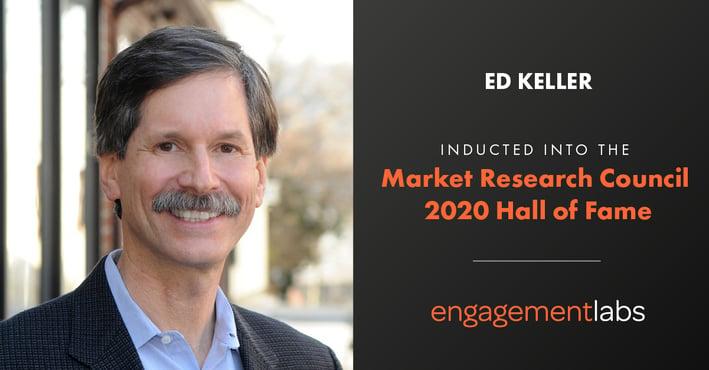
The following is a transcript of Ed Keller’s thoughtful acceptance speech at his induction into the Marketing Research Council’s Hall of Fame. In 2014, Keller was also elected to the Word of Mouth Marketing Hall of Fame by the Word of Mouth Marketing Association (WOMMA).
Chartered in 1927, the Market Research Council is the oldest and one of the most prestigious market research organizations in the world. The MRC Hall of Fame annually recognizes outstanding marketing research professionals since 1977 celebrating leaders such as Arthur Nielsen, David Ogilvy and Burns Roper.
Introduction by Josh Chasin, President of Marketing Research Council (MRC)
Ed Keller is a true pioneer in the field of word of mouth marketing measurement.
Ed’s career spans four decades, starting with Yankelovich and then Roper Starch Worldwide (later Roper ASW), where he rose to CEO.
A former President of the MRC and member of the ARF Board, Keller started the Keller Fay Group with Brad Fay, and developed the only syndicated tracking study of Word of Mouth, which is acknowledged as the standard by which offline consumer conversation is measured.
That work evolved when Keller Fay merged with Engagement Labs and is now the only data and analytics platform to integrate offline and online word of mouth, with predictive analytics to prove their significant impact on marketing ROI and brand performance. In addition to being inducted this year into the MRC Hall of Fame, Keller was also inducted into the Word of Mouth Marketing Hall of Fame in 2014.
Keller Acceptance Speech
Thank you, Josh. And thanks to the MRC membership. This is a wonderful honor.
Let me start by congratulating my fellow inductee today, Alan Wurtzel, the long-time and highly regarded President of Research and Media Development for NBCUniversal. And congratulations to Kalinda Fisher as the inaugural MRC Change Maker Award Winner.
I would also like to acknowledge an amazing group of other current practitioners who were nominated this year. I’m humbled that I am receiving this award today when each and every one of them is so deserving.
There have been 97 inductees into the Market Research Council Hall of Fame before today.
I am proud to say that my lineage is tied to 10 of them.
These are luminaries from the firms I worked for, including three of the founding fathers of our industry: Daniel Starch, who founded his firm in 1923 and was a pioneer in advertising research; Elmo Roper, who started his firm in 1933 and -- along with George Gallup -- invented the field of public opinion polling and scientific sampling; and Elmo “Budd” Wilson, who founded International Research Associates in 1948, which pioneered international research. (In case you didn’t catch it, two out of those three “founding fathers” were named Elmo. When I started at Roper Starch Worldwide, I joked with my wife that our first born would need to be named Elmo – thankfully we had two girls.)
Those three all predated me, but I was fortunate to work with the other seven.
These include Dan Yankelovich, Florence Skelly, and Kevin Clancy from Yankelovich Skelly and White, where I began my career and enjoyed 5 amazing years.
And there are four from Roper Starch Worldwide: Jay Wilson, Elmo Wilson’s son; Bud Roper, Elmo Roper’s son; Harry O’Neill; and Timothy Joyce. I had the honor to introduce both Jay and Harry when they were inducted.
I stand on their shoulders. What made them all stand out was not just their success as professionals, but also that these were wonderful people, so smart and so giving of their time to me and others who worked with them.
Remembering my mentors
Denzel Washington once said, “Show me a successful individual and I’ll show you someone who had real positive influences in his or her life. I don’t care what you do for a living – if you do it well, I’m sure there was someone cheering you on or showing you the way. A mentor.”
“A mentor,” observed Oprah Winfrey, “is someone who allows you to see the hope inside yourself.”
I was blessed in my career to have amazing mentors. I’d like to acknowledge a few of them today.
The first is George Gerber, the long-time and renowned dean of the Annenberg School of Communications at the University of Pennsylvania, with whom I studied from early in my undergraduate days through my graduate training.
Gerbner was one of the foremost scholars studying the impact of violence on television. Among his contributions are what he called the Mean World Syndrome that posited that television violence influenced the public’s conceptions of violence in their lives and in society, making them more fearful and of the belief that the world is more violent and brutal than it really is. New York Times Columnist David Brooks recently invoked Gerbner and the Mean World Syndrome in an Op Ed following the Republican National Convention entitled Trump and the Politics of Mean World.
In addition to all the typical things a graduate student learns from his advisor, including as a research and teaching assistant, I will never forget a career changing conversation Gerbner had when I asked him to provide a job reference for my first job offer.
I finished graduate school in the fall of 1978, the year of a Yankee World Series Championship (Go Yanks!) but also the Energy Crisis, double digit inflation, and an impending recession. It was not an easy time to find a job to say the least.
I finally received an offer. They called Gerbner to ask about my credentials. They asked him at the end if there was anything else about Ed Keller that he wanted to discuss. He said, “Yes. I know why Ed Keller is well qualified for this job; but why is this job good enough for Ed Keller?”
My jaw dropped when he told me this, but it was also a powerful reminder to set high standards and not settle. I took his advice and turned down the offer. Shortly thereafter I had two additional job offers, including one with Yankelovich Skelly and White, which launched my career in the market research industry.
I worked there for 5 years with Madelynn Hochstein as my boss and an early guiding light; then Arthur Shapiro, a senior Yankelovich executive at the time, invited me to start a business with him. That’s a story in its own right but time won’t permit me to tell it today except to thank both Arthur and Madelynn.
In 1986 I joined Roper Starch Worldwide, and my career became heavily influenced by two MRC Hall of Famers and mentors. Bud Roper and Jay Wilson.
Bud was a highly regarded public opinion pollster.
He placed particular attention on the importance of question wording. In fact, his obituary in the LA Times was headlined, Burns ‘Bud’ Roper, 77: Pollster Who Changed Focus of Questions. He authored this now-classic political question, which I am sure you all know: “Do you feel things in this country are generally going in the right direction today, or do you feel that things have pretty seriously gotten off on the wrong track?”
I learned a huge amount from Bud about questionnaire writing, as well as how to think creatively about study design.
I also learned important lessons about integrity and ethics in marketing and opinion research. He believed strongly in openness, honesty, admitting one mistakes if and when they happened, and generally adhering to the highest ethical standards.
My other mentor at Roper Starch Worldwide was Jay Wilson, who was CEO until our sale in 2001 to NOP World. I served as his COO and then succeeded him as CEO. I learned a huge amount from Jay about the business of market research and leadership, and I gained tremendously from his being a good and loyal friend.
Unlike Dan Yankelovich, Florence Skelly or Bud Roper, Jay was not a researcher by training but a salesman; before he entered the research industry, he sold ad space for the Reader’s Digest. Jay proudly displayed a sign on his desk saying, “Nothing happens until someone sells something.” I can certainly relate to that, especially after I started my own company.
Jay’s philosophy for building a successful business was to find unfulfilled information needs and find ways to fill them. This helped guide me as Brad Fay and I set out on the pathway to start up the Keller Fay Group.
There are a lot of reasons why Jay was so successful. But at the core was his truly heartfelt belief that ours is “a people business,” a phrase he would often repeat. He placed a priority on identifying talent, nurturing it, and getting the most out of the people who worked for him. I’ve tried to incorporate this philosophy in my career, too.
Jay was generous to me not only while I worked for him at Roper Starch, but also when Brad Fay and I launched the Keller Fay Group in 2005. Jay was the first in line to help us with his advice, encouragement and to help us secure funding, from both himself and from the long-time investors in Roper Starch Worldwide, Loeb Partners.
Word of Mouth Marketing
My on ramp to word of mouth marketing came as a result of the 2003 publication of my book, The Influentials: One American in Ten Tells the Other Nine How to Vote, Where to Eat, and What to Buy.
I was still CEO of Roper at the time and wrote the book to help boost the visibility of this trend setting segment of the population that we had tracked for many years in Roper Reports, our trend research service.
Early in the book, I wrote these lines that would come to define the next chapter in my career: “The American public has long known the value of word of mouth recommendations. Americans today are far more likely to turn to friends, family, and other personal experts than to use traditional media for ideas and information on a range of topics. . . .This is the bottom line: when Americans make decisions today, it’s a conversation. Before Americans buy, they talk. And they listen.”
Word of mouth marketing was gaining – or shall I say, regaining – favor. My book put me firmly into that world, and led me to meet a group of really smart entrepreneurs who were starting companies to serve this rising demand. We formed a community and a trade association, the Word of Mouth Marketing Association, for which I served as the first Board Chair for a few years.
In the measurement arena, all the action was around the emerging world of social media listening with companies like Buzz Metrics, which later became Nielsen Buzz Metrics. Brad and I knew that offline word of mouth was of equal if not greater importance.
So, we took a play straight out of Jay’s playbook – find unfulfilled information needs and fill them. We created a methodology to measure offline word of mouth and syndicated it through a system we called TalkTrack. I will always be grateful to Kate Sirkin and Starcom who became our first client.
We demonstrated at that time – and it remains true today – there is far more offline word of mouth than there is posting on social media. We then joined forces with Engagement Labs to expand our focus from offline word of mouth only, to a broader perspective including the integration of word of mouth and social media. We built and launched a platform called TotalSocial that integrates the two.
We demonstrated that there is no correlation between what gets said on social media and what gets talked about offline – in other words, one is not a mirror on the other; and our analytics proved that word of mouth and social media are each predictors of business outcomes such as sales and brand health, with offline word of mouth playing a slightly bigger role.
I am proud of our work as it shines a light on important elements of the marketing ecosystem and the forces that drive marketing success that are otherwise unmeasured and therefore unmanaged. I owe a tremendous debt of gratitude to all my colleagues at Engagement Labs, and none larger than to Brad Fay.
I started working with Brad when he was right out of graduate school back in 1988, based on the very good advice of Bud Roper who had been his graduate school professor. I saw in Brad someone with tremendous intellect, creativity, and integrity, and it’s for that reason 7 years later I asked him to join me as my business partner. My thanks to Brad for decades of partnership and it’s my hope that one of these days soon, you too will be receiving this award.
And lastly, I would like to thank the partner who really contributed the most to whatever success I have achieved, my wife of 35 years, Karen. And I love watching the budding careers of my two daughters, Isabel and Meredith, both of whom are destined to achieve great things.
Let me end with this quote by Albert Schweitzer: “Success is not the key to happiness. Happiness is the key to success. If you love what you are doing, you will be successful.”
I have always loved being a part of the market research industry, loved the work I do, loved the colleagues and clients I’ve been able to work with, and I truly appreciate this honor.
Thank you all very, very much.






